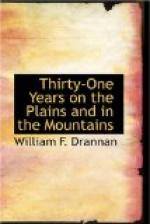Having completed all arrangements we pulled out with one hundred and twenty-five wagons, all told, in the train, but as some of the oxen were very tender footed we had to travel very slowly. I divided my men into squads of twelve each, and changed guards at morning, noon, evening and midnight.
I also started six guards ahead every morning, with instructions to keep from one to three miles from the train on either side, according to the lay of the country. The second day one of the scouts returned from the south and reported having seen six Indians southwest of the train; this was about ten o’clock in the forenoon. I turned and rode off with the scout, saying nothing to anyone in the train. He piloted me to where he had seen the Indians, and sure enough there were the tracks of their ponies in the sand. The scout returned to the train and I followed the trail of the Indian all day, but never got sight of an Indian. When dark came I turned about and rode to camp, arriving there at twelve o’clock that night.
The people in the train were very much pleased to see me return, for they had felt much uneasiness as to my safety, fearing that I might have fallen into the hands of the Pah-Utes. This ride, however, laid me up for two weeks, and I had to go the balance of the way in an emigrant wagon.
The captain of this train had a jaw breaking name that I never heard before or since. It was Sam Molujean, and I know he was the most excitable man that I ever saw. When Capt. Molujean got excited he could not talk at all for stuttering, so one day the guards concluded to have a little sport at the expense of the Captain. We were now nearly opposite where about a month previous a battle with the Pah-Utes had been fought, and the advance guards were riding back to the train—it now being time to corrall for dinner. They met Capt. Molujean, who asked if they had seen any Indians.
One of the guards informed him that there were sixty-odd up the ravine. This set the Captain wild. He wheeled around and rode back to where I was in the wagon and started in to tell me what the guard had said, but he could not utter a word.
After listening to him a minute or so I told him if he would get some one to tell what he wanted I would answer his question. I suppose I was somewhat impatient, as I was suffering from my wound. At this one of the guards rode up with a smile on his face, and I asked him if he could tell me what Capt. Molujean was trying to say to me. He related to me what they had told him in regard to the sixty-odd Indians up the ravine, referring to the Indians that had been killed in battle between the soldiers and Pah-Utes.
We had a good laugh at the Captain’s expense, after which I told him the Indians the guard had reference to were all good Indians.
“Oh! is that so?” he exclaimed, and these were the first words he had been able to utter. “But,” he continued, “I did not know there were any good Indians in this country; I thought all of them were savage.” I told the Captain that those Indians were dead, and that all dead Indians were good ones. This was a stunner for the Captain, and I do not think that the joke has ever penetrated his massive skull.




